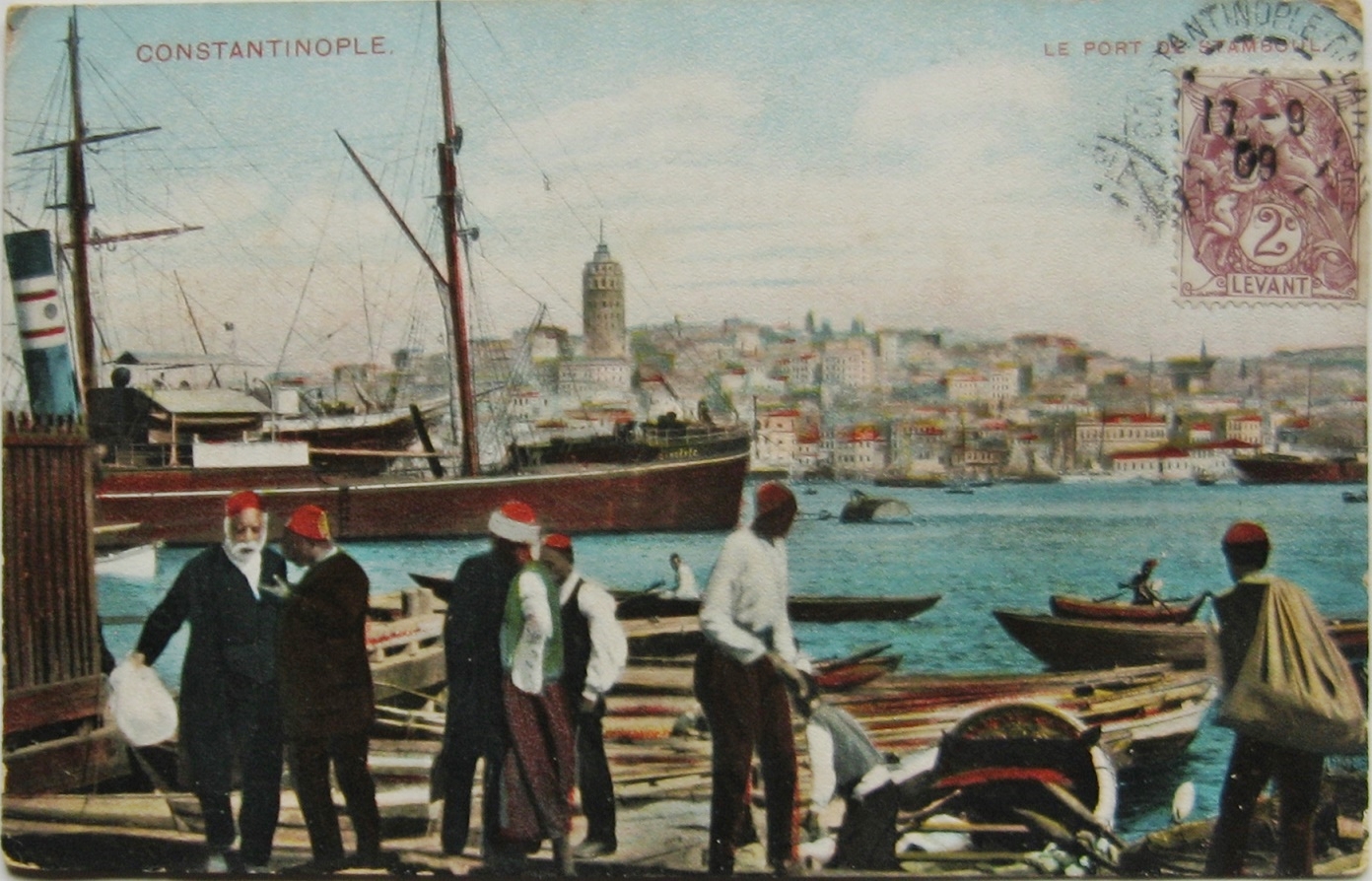|
Levantinization
Levantinization is a term used in different contexts to describe "Levantine" (i.e. non-European) cultural influences in the lands of the former Ottoman Empire, including in the Levant. The term often carries negative connotations (cf. Balkanization). Cornell University, Cornell professor Deborah Starr uses the term to describe the fear of change to Israeli culture during the Mizrahi Jews in Israel, influx of Mizrahi Jews in the 1950s, some of whom had arrived from Levant, Levantine countries. In other contexts, the term has sometimes been used in an Islamophobia, anti-Islamic context for the perceived "cultural contamination" of European values by "Social degeneration, degenerate Levantine influences". Srinivas Aravamudan describes it as "a strategic deformation of orientalism's representational mechanisms". Aravamudan writes that "levantinizations indicate that agency can be found in a number of guises and forms, sometimes within orientalism itself". Constantinople Lady Mary W ... [...More Info...] [...Related Items...] OR: [Wikipedia] [Google] [Baidu] |
Jacqueline Kahanoff
Jacqueline Shohet Kahanoff (; ; May 18, 1917 – October 24, 1979) was an Egyptian-born Israeli novelist, essayist and journalist. Kahanoff wrote in English, although she is best known for a cycle of essays, “A Generation of Levantines,” that was published in Israel in Hebrew translation in 1959. These pieces lay out her notion of “Levantinism,” a social model of coexistence drawn from her childhood experiences in Egyptian cosmopolitan society in the interwar period. Biography Jacqueline Shohet was born in May 1917 in Cairo. Her father, Joseph Shohet, was an Iraqi Jew who had moved to Egypt as a child, while her mother, Yvonne Chemla, was born in Egypt to Tunisian Jewish parents. Her mother's family established the department store Chemla Frères. In 1940, Jacqueline Shohet moved to the United States with her first husband, Izzy Margoliash. After the marriage ended, she moved to New York where she earned a degree in journalism from Columbia University. In 1952 she married ... [...More Info...] [...Related Items...] OR: [Wikipedia] [Google] [Baidu] |
Balkanization
Balkanization or Balkanisation is the process involving the fragmentation of an area, country, or region into multiple smaller and hostile units. It is usually caused by differences in ethnicity, culture, religion, and geopolitical interests. The term was first coined in the early 20th century, and found its roots in the depiction of events during the Balkan Wars (1912–1913) and World War I (1914–1918), specifically referring to incidents that transpired earlier in the Balkan Peninsula. The term is pejorative; when sponsored or encouraged by a sovereign third party, it has been used as an accusation against such third-party nations. Controversially, the term is often used by opponents of secessionism to highlight potential dangers. The Balkan peninsula is seen as an example of shatter belts in geopolitics. Origins of the term Coined in the early 20th century, the term "Balkanization" traces its origins to the depiction of events during the Balkan Wars (1912–1913) ... [...More Info...] [...Related Items...] OR: [Wikipedia] [Google] [Baidu] |
Levant
The Levant ( ) is the subregion that borders the Eastern Mediterranean, Eastern Mediterranean sea to the west, and forms the core of West Asia and the political term, Middle East, ''Middle East''. In its narrowest sense, which is in use today in archaeology and other cultural contexts, it is equivalent to Cyprus and a stretch of land bordering the Mediterranean Sea in Western AsiaGasiorowski, Mark (2016). ''The Government and Politics of the Middle East and North Africa''. p. 5: "... today the term ''Levantine'' can describe shared cultural products, such as Levantine cuisine or Levantine archaeology". .Steiner & Killebrew, p9: "The general limits ..., as defined here, begin at the Plain of 'Amuq in the north and extend south until the Wâdī al-Arish, along the northern coast of Sinai. ... The western coastline and the eastern deserts set the boundaries for the Levant ... The Euphrates and the area around Jebel el-Bishrī mark the eastern boundary of the northern Levant, as d ... [...More Info...] [...Related Items...] OR: [Wikipedia] [Google] [Baidu] |
Tel Aviv
Tel Aviv-Yafo ( or , ; ), sometimes rendered as Tel Aviv-Jaffa, and usually referred to as just Tel Aviv, is the most populous city in the Gush Dan metropolitan area of Israel. Located on the Israeli Mediterranean coastline and with a population of 495,600, it is the economic and technological center of the country and a global high tech hub. If East Jerusalem is considered part of Israel, Tel Aviv is the country's second-most-populous city, after Jerusalem; if not, Tel Aviv is the most populous city, ahead of West Jerusalem. Tel Aviv is governed by the Tel Aviv-Yafo Municipality, headed by Mayor Ron Huldai, and is home to most of Israel's foreign embassies. It is a beta+ world city and is ranked 53rd in the 2022 Global Financial Centres Index. Tel Aviv has the third- or fourth-largest economy and the largest economy per capita in the Middle East. Tel Aviv is ranked the 4th top global startup ecosystem hub. The city currently has the highest cost of living in the wor ... [...More Info...] [...Related Items...] OR: [Wikipedia] [Google] [Baidu] |
Anti–Middle Eastern Sentiment
Anti–Middle Eastern sentiment is hostility to, prejudice towards, or discrimination against people who belong to or originate from the various ethnic groups of the Middle East. Although it is commonly associated with Islamophobia, as Muslims constitute the majority of the region's population, it is a distinct type of hatred in itself and may not always stem from religion-based animosity. People who harbour negative feelings towards the region's people view them as barbaric and inferior on racial, ethnic, cultural, or religious grounds, or a combination of any of these factors. United States In 1993, the American-Arab Anti-Discrimination Committee (ADC) confronted The Walt Disney Company about anti-Arab content in the 1992 animated film ''Aladdin''. At first, Disney denied any problems, but eventually relented and changed two lines in the opening song. However, ADC members were still unhappy with the portrayal of Arab characters and the referral to the Middle East as "barbari ... [...More Info...] [...Related Items...] OR: [Wikipedia] [Google] [Baidu] |
Anti-Arabism In Israel
Anti-Arab racism, also called Anti-Arabism, Anti-Arab sentiment, or Arabophobia, refers to feelings and expressions of hostility, hatred, discrimination, fear, or prejudice toward Arab people, the Arab world or the Arabic language on the basis of an irrational disdain for their ethnic and cultural affiliation. Notable historical instances of anti-Arab racism include the expulsion of the Moriscos from 1609 to 1614, the pacification of Algeria from 1830 to 1875, the Libyan Genocide from 1929 to 1934, the Nakba in Mandatory Palestine from 1947 to 1949, and the Zanzibar massacre in 1964. In the modern era, anti-Arabism is apparent in many nations, including the United States and Israel, as well as parts of Europe, Asia, Africa and the Americas. In the United States, anti-Arab racism surged after the September 11 attacks, resulting in widespread racial profiling and hate crimes against Arab Americans. Arab citizens of Israel and Palestinians in the Israeli-occupied Palestinian ... [...More Info...] [...Related Items...] OR: [Wikipedia] [Google] [Baidu] |
Baruch Kimmerling
Baruch Kimmerling (Hebrew: ברוך קימרלינג; 16 October 1939 – 20 May 2007) was an Israeli scholar and professor of sociology at the Hebrew University of Jerusalem. Upon his death in 2007, ''The Times'' described him as "the first academic to use scholarship to reexamine the founding tenets of Zionism and the Israeli State". Though a sociologist by training, Kimmerling was associated with the New Historians, a group of Israeli scholars who question the official narrative of Israel's creation. Biography Baruch Kimmerling was born in the Transylvanian town of Turda, Romania in 1939. He was born with cerebral palsy, a developmental disability which led him using on a wheelchair for the last three decades of his life. His family narrowly avoided the Holocaust by escaping from Turda in a Romani wagon in 1944, after rumors of the imminent deportation of the Jews began circulating. During the journey, the wagon was strafed by a German plane. When the Kimmerling family returned ... [...More Info...] [...Related Items...] OR: [Wikipedia] [Google] [Baidu] |
Russification
Russification (), Russianisation or Russianization, is a form of cultural assimilation in which non-Russians adopt Russian culture and Russian language either voluntarily or as a result of a deliberate state policy. Russification was at times pursued by the governments of the Russian Empire and the Soviet Union, either as a goal in itself or as a consequence of policies aimed at centralisation and modernisation. The major areas of Russification are politics and culture. In politics, an element of Russification is assigning Russian nationals to lead administrative positions in national institutions. In culture, Russification primarily amounts to the hegemony of the Russian language in official business and the strong influence of the Russian language on national idioms. The shifts in demographics in favor of the ethnic Russian population are sometimes considered a form of Russification as well. Some researchers distinguish ''Russification'', as a process of changing one's ethn ... [...More Info...] [...Related Items...] OR: [Wikipedia] [Google] [Baidu] |
Haredim
Haredi Judaism (, ) is a branch of Orthodox Judaism that is characterized by its strict interpretation of religious sources and its accepted (Jewish law) and traditions, in opposition to more accommodating values and practices. Its members are often referred to as "ultra-Orthodox" in English, a term considered pejorative by many of its adherents, who prefer the terms strictly Orthodox or Haredi (plural: Haredim). Haredim regard themselves as the most authentic custodians of Jewish religious law and tradition which, in their opinion, is binding and unchangeable. They consider all other expressions of Judaism, including Modern Orthodoxy, as "deviations from God's laws", although other movements of Judaism would disagree. Some scholars have suggested that Haredi Judaism is a reaction to societal changes, including political emancipation, the movement derived from the Enlightenment, acculturation, secularization, religious reform in all its forms from mild to extreme, and the ... [...More Info...] [...Related Items...] OR: [Wikipedia] [Google] [Baidu] |
Yosef Lapid
Joseph "Tommy" Lapid (; born Tomislav Lampel [ sr-Cyrl, Томислав Лампел]; 27 December 1931 – 1 June 2008) was a Kingdom of Yugoslavia, Yugoslav-born Israeli radio and television presenter, playwright, journalist, politician and Cabinet of Israel, government minister known for his sharp tongue and acerbic wit. Lapid headed the secular-liberal Shinui party from 1999 to 2006. He fiercely opposed the Haredi Judaism, ultra-Orthodox political parties and actively sought to exclude any religious observance from the legal structure of the Israeli State. He was the father of Yair Lapid, who served as the 14th Prime Minister of Israel in 2022. Biography Lapid was born in Novi Sad, Kingdom of Yugoslavia (modern-day Serbia), to a family of Hungarian Jews, Hungarian Jewish descent. His family was seized by the Nazis and deported to the Budapest Ghetto. His father, Dr. Béla (Meir) Lampel, a lawyer and Zionist leader, was deported to Mauthausen concentration camp, where he was ... [...More Info...] [...Related Items...] OR: [Wikipedia] [Google] [Baidu] |
Shinui
Shinui () was a Zionist, secular, and anti-clerical free market Liberalism worldwide, liberal party and political movement in Israel. The party twice became the third-largest in the Knesset, but both occasions were followed by a split and collapse; in 1977 Israeli legislative election, 1977, the party won 15 seats as part of the Democratic Movement for Change, but the alliance split in 1978, and Shinui was reduced to two seats at the 1981 Israeli legislative election, next elections. In 2003 Israeli legislative election, 2003, the party won 15 seats alone, but lost them all 2006 Israeli legislative election, three years later after most of its MKs left to form new parties. The party was a member of Liberal International until 2009. Though it had been the standard-bearer of economic liberalism and secularism in Israel for 30 years, the formation of Kadima robbed Shinui of its natural constituency, and in January 2006 the party split into small factions, none of which managed to ove ... [...More Info...] [...Related Items...] OR: [Wikipedia] [Google] [Baidu] |






